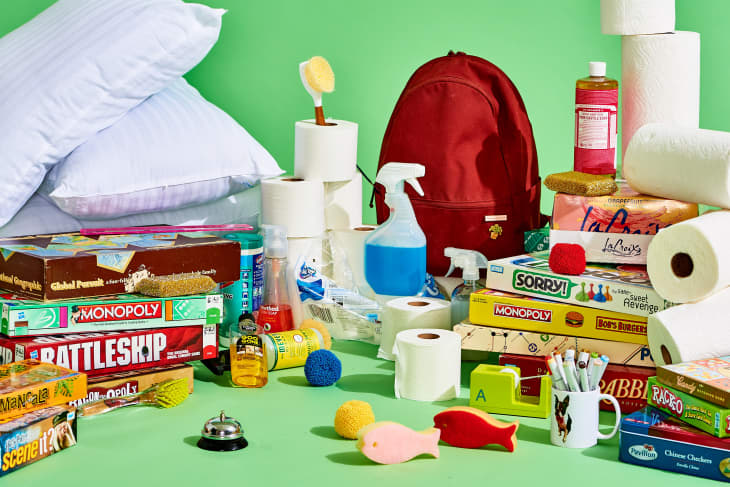4 Things You Should Never, Ever (and Actually Can’t) Donate

As the holidays approach, you’re probably beginning to haul your seasonal decorations and wrapping paper out from storage. Surprise! Your storage space is brimming with things you totally forgot about, too. But don’t be dismayed by all the crap you forgot—it’s actually great that you’re noticing it during a season when giving back is top of mind. Think of the holidays as your yearly reminder to donate your old, outgrown, and gently used items.
However, as you start on your decorate-and-purge journey, keep in mind there are some items that absolutely no one wants—but that doesn’t mean you have to throw them away! Here, four things you should recycle or repurpose instead of donate:
Anything too ripped, stained, or broken
As a rule of thumb, you should never donate any clothing, items, or toys that are ripped, stained, or broken beyond repair or cleaning. If you wouldn’t wear it yourself, allow your child to play with it, or even want anyone to look at it—don’t drop it in the donation box. Instead, research the nearest drop-off for recycling (if your municipal service does not take them.) Recyclenow.com has pretty comprehensive information about how and where to recycle common objects.
Recalled and unsafe items
Most charities cannot accept items that have been recalled, banned, or deemed unsafe. If you’re on the fence about an item, you can check Recalls.gov’s search tool. The tool searches databases across six federal agencies for products considered “unsafe, hazardous, or defective.” Many times, the manufacturer will take back the recalled items for safe disposal, so reach out to them before trying to drop them off at your donation center. And yes, this includes ammunition, explosive materials, and fireworks.
Household chemicals
If you’ve got a bottle of multipurpose cleaner gathering dust beneath your sink, you’re better off giving it to a friend or neighbor than donating it. Thrift store employees can’t confirm that the cleaning product is labeled correctly, and their facilities usually aren’t qualified to safely handle toxic chemicals. No one to give it to? Don’t just throw it in the trash. Do a bit of research on how to dispose of toxic chemicals in your area. Usually, your state will provide a list of collection centers near you, like this list for Arkansas.
Actual garbage
As a former Goodwill employee, I can’t count the number of times our receiving staff was handed a large trash bag, presumably full of clothes, only to open it and find someone’s literal household garbage. I’m not sure if people get the bags confused on their way to the dump and the thrift store, but however the error occurs, it’s never pleasant for a thrift store employee to come face-to-face with your banana peels and coffee grounds. Double check before you hand your bags off, and you’ll be saving people the trouble (and the smells!)
Large items
While it’s appealing to finally be rid of the large items cluttering your garage or attic, do a little research before hauling those to your donation center. “Each Goodwill organization has its own criteria for items that are welcomed as donations,” said Kyle Stewart, senior director of donated goods retail at Goodwill. The differences in what will and will not be accepted by a donation center largely depend on an item’s size, safety, and the center’s resources.
Most thrift stores don’t take mattresses because of sanitation and bed bug concerns. For this same reason that they don’t take large appliances like ovens or refrigerators, either. On top of these items being strenuous to move and store, they’re often not adequately cleaned before donors drop them off—causing risk to the store’s entire stock. If they don’t have the resources to accept these items, ask if they know of local services that can safely recycle or dispose of them.
There are some thrift stores that will even take your old vehicles, but since these are so few and far between, do your research before you roll up.